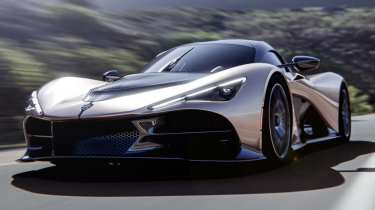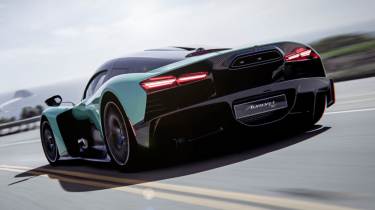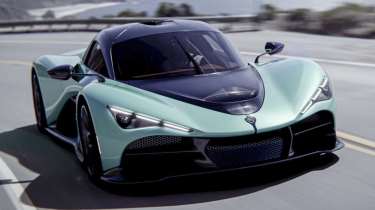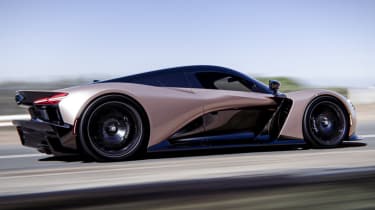Zenvo's 1850bhp Aurora hypercar is ready to run – look out Bugatti
The production version of Zenvo's V12-engined Koenigsegg-fighter with 1850bhp, set to enter production in 2026, has been revealed
Zenvo isn’t a household name like Bugatti or Ferrari, but in terms of sheer numbers and madness, its hypercars can match just about anything. Its newest creation is the Aurora, which will take on the likes of the Bugatti Tourbillon, Ferrari F80, Hennessey Venom F5 Evolution and Koenigsegg Jesko at the very top of the hypercar tree, packing the most powerful V12 in a road car and a hybrid system to go with it. It’s the first all-new Zenvo since the ST1 from 2008, and has been revealed in full production specification ahead of dynamic runs at the 2025 Goodwood Festival of Speed. Customer deliveries are expected to commence in late 2026.
With a carbonfibre construction, radical aero and a dry weight of 1300kg in its lightest form, the Aurora could be one of the most capable road cars ever devised. Being designed to cover both ends of the hypercar spectrum, there are two versions: a GT-orientated Tur model (now revealed in production form) and a track-ready Agil specification (still to be completed).
Fully revealed in production spec, the Aurora Tur differs very subtly from the styling models that Zenvo has been showing off over the last couple of years. The most obvious visual and technical change is the duct cut into the top of each door panel, presumably to channel air to that monstrous V12 (more on which further down). The other notable change is the sculpted bridge on the Aurora’s snout. This raised bump houses a new central air outlet, replacing the outlets that were once aft of the lights, atop the wings. It’s also shaped to help guide air down the side of the car, into those new door intakes.
Also revised is the splitter, with lower areas at the sides gliding up into a higher central point, allowing more airflow to reach the trick ground effect elements in the underbody. At the rear, the number plate is now mounted lower down, on a revised, less jagged, single-piece carbon diffuser element.
Apart from these changes the Aurora appears very much as we remember it – incredibly striking, nicely proportioned. One of the advantages of virtual wind tunnels and CAD is that you can get a design very close to spot on before you’ve even fired up the autoclave. It’s this Zenvo Aurora Tur model that will be running up the hill at Goodwood, giving us our first listen to that monstrous V12.
Zenvo Aurora – powertrain and specs
Both verions use a hybrid-assisted 6.6-litre quad-turbo V12, with the Agil using a 200bhp electric motor nestled within the gearbox for a combined output of 1450bhp, and the Tur adding a motor at each front wheel to enable four-wheel drive, torque vectoring and a power boost to 1850bhp.
Both the Tur and Agil use a single-shaft seven-speed paddleshift gearbox made by British firm Ricardo, with unique ratios and mapping for road and track use respectively. For the Agil, Zenvo is targeting a 0-62mph time of 2.5sec, with the Tur completing the sprint in just 2.3sec. Even more impressive is the Tur’s 0-186mph time: a scarcely believable 9sec. With its extra power and low-drag aero profile, the Tur is projected to hit 280mph flat out, with the Agil maxing out at 227mph.
1250bhp of the Aurora’s total power output comes from the combustion engine, making it the most powerful V12 in a road car. Mounted behind the passenger cell with a ‘hot-vee’ turbo configuration, it revs to 9800rpm and draws from the hybrid system to add power and fill any torque gaps in its delivery. The engine features Mahle’s jet ignition system, which enables it to run in Lambda 1, with zero oxygen and fuel starvation or wastage for near-perfect performance and emissions control. This is key to the engine being homologated for use in global markets.
Zenvo Aurora body and chassis
The Aurora’s skeletal bodywork barely hides the carbon structure beneath, with aero tunnels channelling flow around the chassis to generate downforce and minimise drag. The front and rear carbon subframes and double-wishbone pushrod suspension are visible through these air pathways, with the Agil gaining a larger front splitter and an enormous rear wing in place of the Tur’s active rear ducts. According to Zenvo, the Agil generates 880kg of downforce at 155mph and trims 150kg from the Tur’s 1450kg dry weight.
Given the extra aero load and lighter kerb weight of the Agil, it’ll adopt a different calibration for its active suspension than the road-biased Tur, while offering the option of Michelin Pilot Sport Cup 2 R tyres in place of the standard Cup 2s. Both will use a bespoke braking system developed by Alcon, with aluminium monobloc calipers and carbonfibre-reinforced silicon carbide discs.
The opposing characters of the Agil and Tur models are evident inside, with the Agil offering a stripped-out cabin with exposed carbon elements and the Tur opting for a more luxurious approach with extra sound deadening. Just 100 Auroras will be built at Zenvo's Denmark HQ, with production split down the middle between the two variants. Pricing has yet to be announced, but given its rarity and mechanical specification, you can bet it’ll be well into seven figures.
Future Zenvo supercars
The V12 as well as the chassis have been designed to be modular, with the potential to spawn a V10, V8 or V6. The plan is for these to be used in a broader line-up of Zenvo models, sitting beneath the flagship Aurora.
Is there room for a boutique hypercar manufacturer like Zenvo to build in greater numbers a rival to the likes of the Aston Martin Valhalla and Lamborghini Revuelto? Potentially, though there are plenty of hurdles to clear before then, namely, completion of development, production and delivery of the Aurora hypercar that’s charged with getting the ball rolling.






